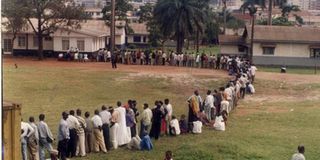15 districts determine presidential poll

Voters at Nakivubo Blue P/S Kampala polling centre lineup to cast their votes during the 2001 general elections. file Photo
What you need to know:
Ranked. Kampala leads followed by Wakiso while Amudat has the smallest number of voters.
Are you one of the 40-plus persons who will have picked nomination forms to run for the presidency in the 2016 general election? If so, then you would want to know the districts in Uganda with the highest number of registered voters?
First is Kampala in which 1,180,347 people registered to vote. According to the 2014 census, Kampala’s population is 1,516, 210.
Second is Wakiso, which has 749,476 registered voters. According to the 2014 provisional census results, Wakiso’s total population is 2,007,700.
The other districts with many registered voters are Kasese (303,125), Mubende (275,101), Arua (254,580), Mukono (244,856) and Kibaale (243,777).
Jinja has 236,770 registered voters, Mbarara (230,212), Ntungamo (220,400), Mbale (218,029), Kabale (214,296), Kabarole (209,148), Iganga (205,364) and Tororo with 205,135.
Together, the 15 districts listed have 5,200,727 (34.6 percent) of the estimated 15 million voters.
On the other hand, the districts with the fewest registered voters are Amudat, which has 21,023, Buwuma (26,480), Ntoroko (31,561), Otuke (32,793), Bukwo (33,042) and Nakapiripirit (42,421).
If all the registered voters in the above districts were to turn up at the polling booths in February 2016, and vote for a particular contestant, that contestant would stand a higher chance of clinching the presidency.
“A district would not guarantee you outright victory; it would be a very narrow focus,” Dr Frederick Kisekka–Ntale, a political analyst, however, says.
“If you focus on a region, it would make more sense.”
He says the voting pattern in districts is susceptible to the various social parameters like ethnicity, poverty, and social profiles and even standing of a candidate or candidates.
Still, Dr Kisekka–Ntale says one could count on the support of a populous district to influence the smaller districts.
It is not clear if this is what informed former premier, Amama Mbabazi’s decision to hold his first ‘consultative meeting’ in Mbale, the hub of Elgon sub-region.
His subsequent consultative meeting in Kapchorwa was thronged by people, prompting the Uganda Police Force to disperse the crowd and refusing to okay his other planned consultative meetings.
Regions matter
Dr Patrick Wakida, the executive director of Research World International, concurs that it is the regions, not the districts, that will be determine who will be president.
He says it will be the northern region, which will probably determine who will be president in 2016.
The Electoral Commission’s results from the 2011 election indicate that President Museveni’s fortunes improved in northern Uganda.
He garnered 56.9 per cent of the valid votes cast in northern Uganda, up from less than 30 per cent in the 2006 polls.
Whereas government functionaries attributed this to the routing of the Lord’s Resistance Army insurgents in 2005, Acholi leaders said the local people had either been intimidated or bribed.
Dr Wakida urges presidential candidates not focus on just the number of registered voters.
“The assumption would be that everybody will turn up to vote, which is not the case,” Dr Wakida told this newspaper during an interview on September 18.
“Kampala has many educated people [but] who rarely turn up to vote,” he says. “They do not think voting will change anything.”
Some believe the candidates they voted for during the local council or parliamentary polls were cheated.
Over the years, the number of people who have been ‘abstaining from voting’ has increased. In 2011 alone, 5.7 million voters did not turn up to vote.
This has been due to the violence, ballot stuffing/rigging and the belief that the army, the police and the intelligence services would act unprofessionally by standing by the incumbent.
Uganda does not have a law that compels citizens who are 18 years and above to register to vote.
There isn’t any either that dictates voting compulsory although citizens have a constitutional duty to participate in the governance of the country.
To encourage more Ugandans to vote, the country would have to put in place an independent electoral commission, among other things.
This could be achieved by giving the power to appoint people to be EC commissioners to an independent body so that they are not beholden to the President, who currently appoints EC commissioners.
Besides reform of electoral laws, candidates would have to frame their manifestos around the issues of importance to people in the different regions. These vary from district to district.
For example, in Kampala, which has more unemployed people than say Kabale, an aspirant would have to tell the people how he or she intends to create more employment opportunities.
In areas like Kabale where many people live on agriculture, an aspirant would have to tell the people how he or she will help to ensure high prices for farm produce.
They would also have to convince them to turn up in large numbers to vote.




